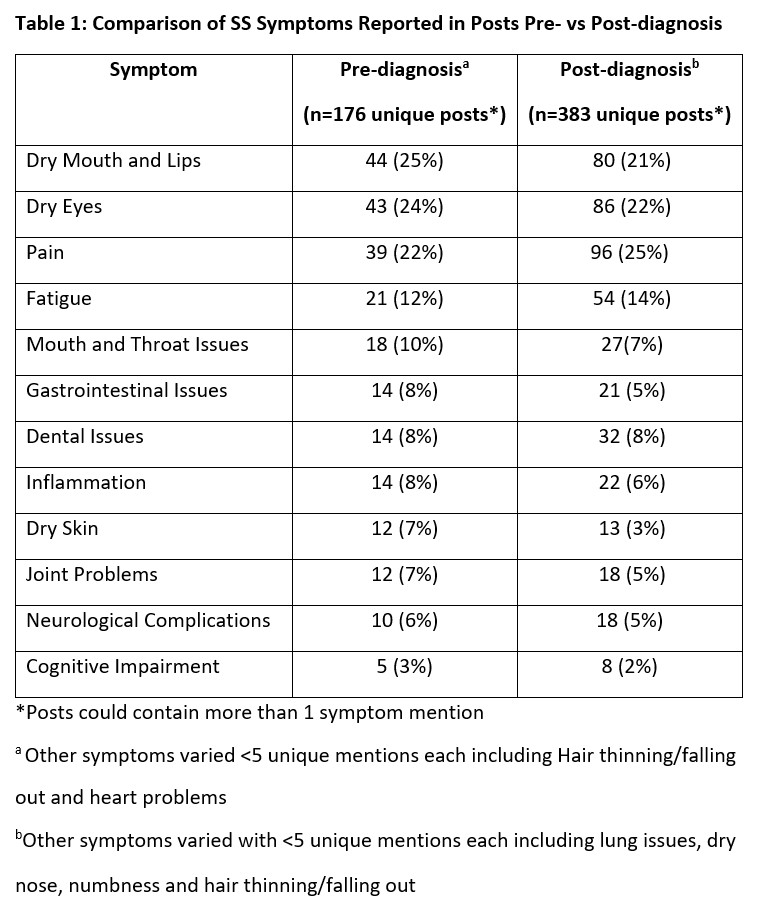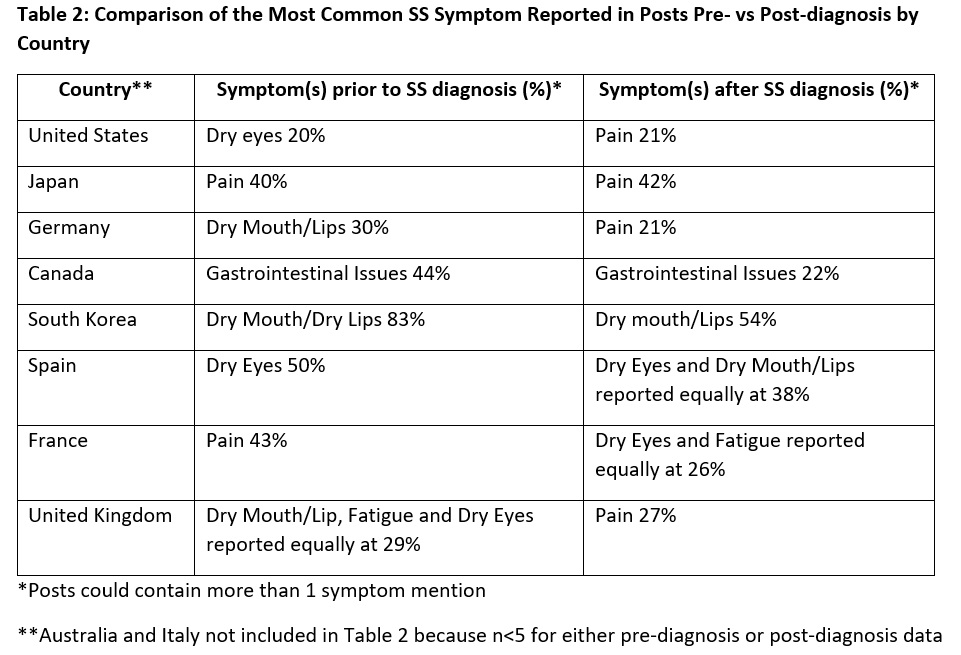Session Information
Session Type: Poster Session B
Session Time: 10:30AM-12:30PM
Background/Purpose: Patients with Sjögren’s Syndrome (SS) often undergo a prolonged and complex path to diagnosis and experience symptom, disease and treatment burdens with multiple co-morbid conditions that impact patient lives. However, little is known about the patient experience of SS prior to and after diagnosis. This ethnographic study aimed to understand the global patient experience of SS, particularly symptom burden and life impact, as reported in social media posts pre- and post-diagnosis to better inform the design and use of patient experience data in future clinical trials.
Methods: A social listening methodology captured global public social media posts from 1/1/2023-12/31/2023, using treatment- and disease-related search terms and technologies such as web crawlers and data partnerships. Posts discussed an SS patient’s experience with the following: symptoms, life impact, comorbid conditions and/or treatment. Sociolinguists analyzed the posts in the native language using qualitative and quantitative methods. A single post could report multiple patient experience characteristics. This analysis focused on disease symptoms and life impacts.
Results: A total of 1,044 posts described the experience of SS globally from identifiable patients (96%), caregivers (4%) and health care professionals (< 1%). Posts were on X (58%), forums (31%) and Reddit (11%). Post volume by country were the United States (33.5%) Japan (21.6%), Germany (10.8%), the United Kingdom (9.6%), Canada (9.6%), France (5.7%), Spain (3.9%), South Korea (2.6%), Australia (2.4%) and Italy (< 0.3%). Impacts of the disease were described as challenges to daily functioning (e.g., inability to do daily tasks/excercise) (19%), emotional impact (e.g., negative emotions due to the disease and its care, feelings of frustration, anger, stress, sadness due to chronic fatigue and pain, loss of hobbies, isolation, financial difficulties) (16%) and health vulnerability (e.g., concerns about being immunocompromised) (11%). Table 1 compares symptoms and Table 2 compares the most common symptom by country.
Conclusion: This linguistic analysis of global social media posts showed that the SS patient experience differs pre- and post-diagnosis and by country. The increase in pain and fatigue mentions suggests a decline in quality of life, despite a diagnosis and underscores the impact of symptoms that may be challenging to treat. Although, dryness, gastrointestinal and mouth/throat issues declined slightly, reports of dental problems persisted, underscoring long-term impact. These findings provide an understanding of SS patient experience that can inform the design of patient experience data in SS clinical trials. Future research on the natural history of SS is needed to better understand its utility.
To cite this abstract in AMA style:
Ali S, Oberdhan D, Richardson M, Amorelli J, Martini A, Dandy J. Pre- and Post-Diagnosis Comparison of the Patient Experience of Sjögren’s Syndrome (SS): A Linguistic Analysis of Global Social Media Conversations [abstract]. Arthritis Rheumatol. 2024; 76 (suppl 9). https://acrabstracts.org/abstract/pre-and-post-diagnosis-comparison-of-the-patient-experience-of-sjogrens-syndrome-ss-a-linguistic-analysis-of-global-social-media-conversations/. Accessed .« Back to ACR Convergence 2024
ACR Meeting Abstracts - https://acrabstracts.org/abstract/pre-and-post-diagnosis-comparison-of-the-patient-experience-of-sjogrens-syndrome-ss-a-linguistic-analysis-of-global-social-media-conversations/


